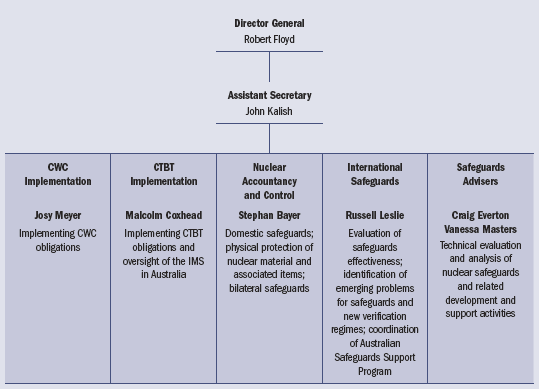On this page
Corporate Governance
Portfolio Minister
Responsibility for administration of the legislation under which ASNO operates–the Nuclear Non-Proliferation (Safeguards) Act 1987, Chemical Weapons (Prohibition) Act 1994 and Comprehensive Nuclear-Test-Ban Treaty Act 1998–rests with the Minister for Foreign Affairs, Mr Kevin Rudd MP.
Director General ASNO
The Director General ASNO reports directly to the Minister for Foreign Affairs and Trade. The position combines the statutory offices of the:
- Director of the national authority for nuclear safeguards (formerly Director of Safeguards), as established by the Nuclear Non-Proliferation (Safeguards) Act 1987
- Director of the national authority for the Chemical Weapons Convention, as established by the Chemical Weapons (Prohibition) Act 1994
- Director of the national authority for the Comprehensive Nuclear-Test-Ban Treaty, as established by the Comprehensive Nuclear-Test-Ban Treaty Act 1998.
The Director General ASNO is a statutory position, appointed by the Governor-General. Remuneration for this position is determined by the Remuneration Tribunal.
Mr John Carlson held the position of Director General ASNO from 31 August 1998 to 30 September 2010, having previously held the position of Director of Safeguards since 1989. Upon the expiration of Mr Carlson's appointment Dr John Kalish acted as Director General ASNO until the appointment of the new Director General.
Dr Robert Floyd was appointed as the new Director General ASNO on 29 November 2010 for a period of five years.
Assistant Secretary ASNO
The Assistant Secretary ASNO deputises for the Director General and is responsible for the day-to-day operations of the office. Dr John Kalish has held this position since April 2010.
ASNO Staff
ASNO has a small core of staff whose day-to-day activities are overseen by the Director General. ASNO staff are employed under the Public Service Act 1999 as a division within the Department of Foreign Affairs and Trade (DFAT). ASNO staff, other than the Director General, are also employed under the DFAT Enterprise Agreement. Further details can be found in Table 13 and the DFAT Annual Report 2010–11.
In 2010–11 ASNO achieved an average staff level of 14.8 (against an approved level of 17).
ASNO Administrative Review
In 2009 ASNO commenced a detailed review of administrative processes and implementation of a Quality Management System (QMS) to ensure ASNO processes are fully accountable, effective and efficient and meet ASNO's goals and responsibilities. The review of ASNO's processes included accounting for AONM, the nuclear permit system, inspections, reporting to the IAEA and ultimately all of ASNO's functions. ASNO continued with steps to implement a QMS which will be fully implemented during 2011–12.
Figure 7: ASNO's Organisational Structure – (AS AT 30 jUNE 2011)
Table 13: ASNO Staff at 30 June 2011
| Male | Female | Total (Approved) | |
|---|---|---|---|
| SES B2 | 1 | 0 | 1 (1) |
| SES B1 | 1 | 0 | 1 (1) |
| Executive Level 2 | 4 | 2 | 6 (6) |
| Executive Level 1 | 2 | 1 | 3 (2) |
| APS Level 6 | 1 | 3 | 4 (4) |
| APS Level 5 | 0 | 1 | 1 (1) |
| APS Level 4 | 0 | 1 | 1 (2) |
| TOTAL | 9 | 8 | 17(17) |
Training and Development
ASNO's primary training requirements are professional development of specialist skills. ASNO is proactive in managing this training, in part through a schedule of conference programs. Further details are in Table 14.
Table 14: Training and Development Activities during 2010–11
| Training and Development Activity | Person Days |
|---|---|
| Formal DFAT courses | 21 |
| Structured work unit & on-the-job training including planning days | 17 |
| Seminars, workshops, conferences, overseas negotiations & IDCs | 60 |
| External formal courses | 17 |
| Academic study | 82 |
| Other (IAEA Consultancy) | 4 |
| TOTAL | 201 |
Next section: Financial Management
Previous section: Performance


